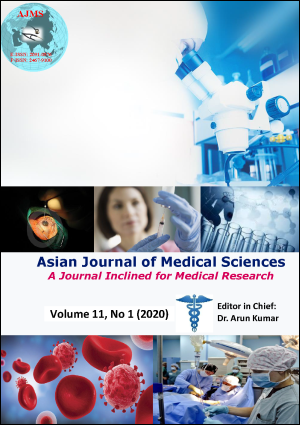Effect of Lactobacillus paracasei HII01 on lipid profile and blood parameters in hypercholesterolemic patients: A preliminary study
Keywords:
Probiotics, Lactobacillus paracasei, Hypercholesterolemia, High-density lipoprotein, Low-density lipoproteinAbstract
Background: Probiotics are live microbes that when administered in suitable amounts, confer a health benefit on the host. Probiotics are considered as a complementary and supportive therapeutic agent for the treatment of several diseases and for the management of several disorders. Hypercholesterolemia is a major risk factor for the incidence of cardiovascular (CV) diseases. Several pharmacological and dietary approaches are proposed and used to improve the cholesterol profile.
Aims and Objective: The objective of the current study was to study the effect of probiotic supplementation (Lactobacillus paracasei HII01) on high-density lipoprotein (HDL), and low-density lipoprotein (LDL), lipopolysaccharide (LPS), and immunoglobulin A (IgA) levels in hypercholesterolemic patients.
Materials and Methods: Ten hypercholesterolemic subjects were supplemented with 12.5 × 109 CFU of HII01 per day for 12 weeks. Blood samples were collected at baseline and after the intervention period. The LDL-C, HDL-C, LPS, and IgA content were assessed by outsourcing and ELISA methods.
Results: After 12 weeks of intervention, HDL (from 61.14 ± 9.65 to 67.29 ± 7.99 mg/DL), LDL (from 141.57 ± 31.95 to 126.29 ± 36.23 mg/DL), IgA (446.31 ±262.00 to 939.62 ± 758.52 ng/ml), and LPS (113.53 ± 40.07 to 72.78 ± 32.39 pg/ml) levels were significantly changed in the probiotic-supplemented group when compared to the baseline value.
Conclusion: The supplementation of L. paracasei HII01 may help to improve the lipid profile, reduce the endotoxin level and have the impact of immune activation in hypercholesterolemic subjects. Additional studies are mandatory to disclose the favorable effect of the probiotic strain L. paracasei HII01.
Downloads
Downloads
Published
How to Cite
Issue
Section
License
Authors who publish with this journal agree to the following terms:
- The journal holds copyright and publishes the work under a Creative Commons CC-BY-NC license that permits use, distribution and reprduction in any medium, provided the original work is properly cited and is not used for commercial purposes. The journal should be recognised as the original publisher of this work.
- Authors are able to enter into separate, additional contractual arrangements for the non-exclusive distribution of the journal's published version of the work (e.g., post it to an institutional repository or publish it in a book), with an acknowledgement of its initial publication in this journal.
- Authors are permitted and encouraged to post their work online (e.g., in institutional repositories or on their website) prior to and during the submission process, as it can lead to productive exchanges, as well as earlier and greater citation of published work (See The Effect of Open Access).




